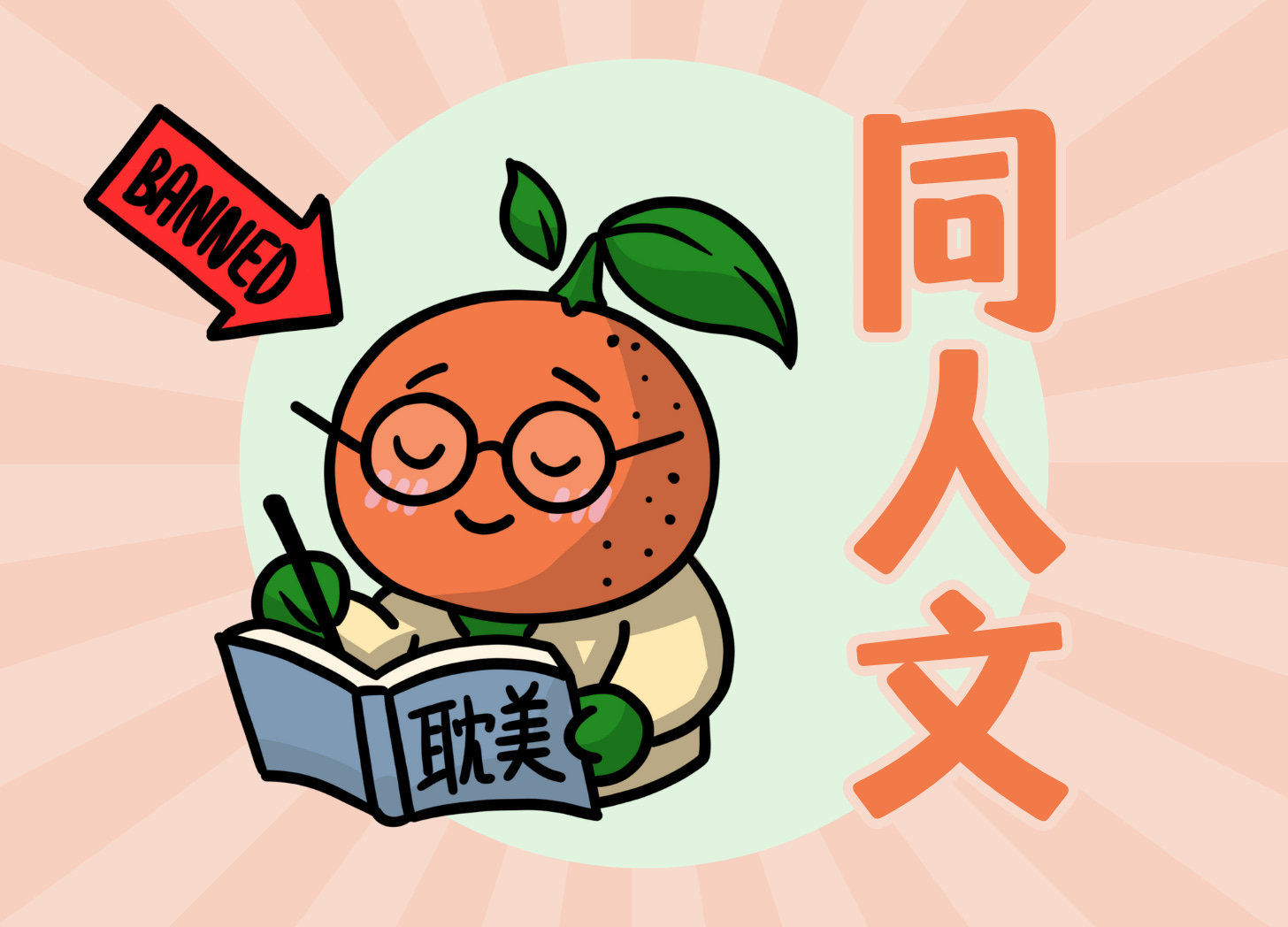China’s Crackdown on Online Fan Fiction
Chinese Danmei Writers — Authors of Homoerotic Fiction — Face Renewed Police Persecution 👮🏼
Word of the week: 同人文 (tóngrén wén)
Meaning: fanfiction.
耽美是指描写男性之间情感或恋爱的文学作品,常与同人文结合出现。Danmei refers to literary works that depict emotional or romantic relationships between men, often combined with fanfiction.
In recent weeks, China has intensified its crackdown on danmei literature—a genre of homoerotic fiction often written by and for women—prompting widespread concern within the country’s vibrant fan fiction community. The reason? Authorities claim it promotes the spread of “improper values” online.
Let’s read more about danmei creators and how the Chinese state wants to curb their freedom.
继12月中国安徽m. 执法单位跨省抓捕逾50同性情色/耽美小说作者后,中国西北兰州警方近日再次对耽美文学作者实施大规模跨省抓捕,引发中国互联网大规模声讨,也再次将公众目光聚集在耽美文学这一亚文化现象及其生命力和对主流文化的影响。
继 (jì) – following; after
执法单位 (zhífǎ dānwèi) – law enforcement unit
跨省 (kuà shěng) – cross-provincial; across provinces
同性情色 (tóngxìng qíngsè) – same-sex erotic (content)
耽美 (dānměi) – danmei; a genre of male-male romance fiction
互联网 (hùliánwǎng) – internet
声讨 (shēngtǎo) – to publicly denounce; to criticize
公众 (gōngzhòng) – the public
目光 (mùguāng) – gaze; attention
聚集 (jùjí) – to gather; to focus
亚文化 (yà wénhuà) – subculture
现象 (xiànxiàng) – phenomenon
生命力 (shēngmìnglì) – vitality; life force
主流文化 (zhǔliú wénhuà) – mainstream culture
After law enforcement authorities in Anhui, China, carried out a cross-provincial crackdown in December, arresting more than 50 authors of homoerotic (danmei) novels, police in Lanzhou, northwest China, have recently launched another large-scale operation targeting danmei literature writers across provinces. This has sparked widespread outcry across the Chinese internet and once again drawn public attention to the danmei literary subculture—its vitality and its influence on mainstream culture.

过去三周,陆续有中国耽美小说写手在社交平台微博上发文描述自己被兰州市警方“远洋捕捞”的经过。这些为了规避审核省去大部分细节内容的贴文指称,兰州警方此次带走包括在校大学生在内的数位创作者,并计划在六月晚些时候立案起诉他们。
陆续 (lùxù) – one after another; successively
写手 (xiěshǒu) – writer (informal); author
社交平台 (shèjiāo píngtái) – social media platform
微博 (wēibó) – Weibo (Chinese microblogging platform)
远洋捕捞 (yuǎnyáng bǔlāo) – deep-sea fishing (used metaphorically here for “cross-provincial arresting”)
经过 (jīngguò) – process; course of events
规避 (guībì) – to evade; to avoid
审核 (shěnhé) – censorship; review
省去 (shěngqù) – to omit; to leave out
细节 (xìjié) – detail
贴文 (tiēwén) – post (on social media)
指称 (zhǐchēng) – to allege; to claim
晚些时候 (wǎnxiē shíhòu) – later on
立案 (lì'àn) – to file a case
起诉 (qǐsù) – to prosecute; to bring a lawsuit against
Over the past three weeks, Chinese danmei fiction writers have been posting on the social media platform Weibo, describing their experiences of being “deep-sea fished” by police from Lanzhou city. These posts, which omit most details in order to evade censorship, allege that the Lanzhou police detained several creators—some of whom are currently enrolled university students—and plan to formally press charges against them later in June.
也有大学生写手或面临被取消研究生录取资格的境地,有民众在网上高呼创作自由并接力为被囚人士提供法律、心理援助,亦有海外华人团体预备游行、声援耽美创作者。
录取资格 (lùqǔ zīgé) – admission qualification
境地 (jìngdì) – situation; condition
高呼 (gāohū) – to shout; to call out loudly
创作自由 (chuàngzuò zìyóu) – creative freedom
接力 (jiēlì) – to take turns (like in a relay)
被囚人士 (bèi qiú rénshì) – detained individuals
援助 (yuánzhù) – assistance
游行 (yóuxíng) – protest; march
声援 (shēngyuán) – to express support
Some student writers are also facing the possibility of having their graduate school admissions revoked. Meanwhile, members of the public have taken to the internet to call for creative freedom and are taking turns providing legal and psychological support to those who have been detained. Overseas Chinese groups are also preparing protests to show solidarity with danmei creators.

耽美文学指的是同性情爱小说,同人创作则指的是在已有文学剧作基础上,以既有背景进行二次创作、迎合钟情此类题材的读者。二者重合度较高,常相伴相随出现。在中国,近年来较为出名的耽美作品有曾一度红透半边天的《陈情令》、《鬓边不是海棠红》、《上瘾》等。
指的是 (zhǐ de shì) – refers to
同人创作 (tóngrén chuàngzuò) – fanfiction
已有 (yǐyǒu) – existing
文学剧作 (wénxué jùzuò) – literary and dramatic works
既有 (jìyǒu) – already existing
二次创作 (èrcì chuàngzuò) – derivative creation; secondary creation
迎合 (yínghé) – to cater to; to accommodate
钟情 (zhōngqíng) – to be fond of; to be passionate about
二者 (èrzhě) – the two; both
重合度 (chónghé dù) – degree of overlap
相伴相随 (xiāngbàn xiāngsuí) – to accompany each other; to appear together
较为出名 (jiàowéi chūmíng) – relatively well-known
曾一度 (céng yídù) – once; at one time
红透半边天 (hóng tòu bànbiān tiān) – wildly popular (lit. "red across half the sky")
Danmei literature refers to homoerotic romance fiction. Fanfiction, on the other hand, refers to derivative works based on existing literary or dramatic productions, using established settings to cater to readers who are especially fond of such themes. The two genres have a high degree of overlap and often appear together. In China, some of the most well-known danmei works in recent years include The Untamed, Winter Begonia, and Addicted, all of which were once wildly popular.
大部分耽美文学作品发表在海棠网,一个服务器架设在台湾的成人文学网站,以及AO3等中国创作者的热门“流放地”平台。这些平台整合了近年来多次遭封杀、服务器在中国境内的耽美同人创作网站。
海棠网 (Hǎitáng Wǎng) – Haitang website (adult fiction site)
服务器 (fúwùqì) – server (computing)
架设 (jiàshè) – to set up; to install
AO3 (Āōsān) – Archive of Our Own (international fanfiction platform)
流放地 (liúfàngdì) – place of exile; exile zone
遭 (zāo) – to suffer; to be subject to (often negative)
封杀 (fēngshā) – to ban; to shut down
Most danmei literature is published on Haitang, an adult literature website hosted on servers in Taiwan, as well as on AO3 and other platforms that have become popular “exile zones” for Chinese creators. These platforms have consolidated the danmei fanfiction websites that, in recent years, have been repeatedly shut down and had their servers based within mainland China.
即便在中国批判耽美、同人文学的背景下,依然不难发现当局对其批判的原因聚焦在传播不当价值观,而这个不当价值的主流就是同性恋爱文化。
即便 (jíbiàn) – even if; even though
当局 (dāngjú) – the authorities
不当 (bùdàng) – inappropriate; improper
Even within the context of China’s criticism of danmei and fanfiction literature, it is still easy to see that the authorities’ main reason for condemnation focuses on the spreading of inappropriate values—chief among them being homosexual romantic culture.
Do you often read fan fictions? What do you think of this ban in China?
Antoine & Dorota
Referenced author(s): BBC Chinese







